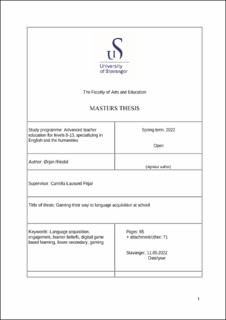| dc.description.abstract | This thesis is a study on how Norwegian lower secondary students experience engagement and language acquisition whilst playing digital games in the EFL classroom. Listening to learner beliefs has shown important for teachers to improve on their teaching practice. Digital game based learning is a teaching practice which teachers have implemented increasingly over the last years.
Digital games have shown to have several positive impacts on both engagement and language learning amongst young students. Engagement have shown as an important factor to enhance both students’ learning process and language learning. However, the use of digital games in classrooms is still a fairly unexplored research field due to the rapid development of digital games and teaching practices. Therefore, more research is needed in the growing research field of using digital games within language learning. Thus, the current study aims to answer the following research questions:
1) How do Norwegian lower secondary students perceive second language acquisition using digital games based learning in the EFL classroom?
2) How do Norwegian lower secondary students experience gaming using digital game based learning in the EFL classroom?
A qualitative methods approach in form of two focus group interviews and observation were used to answer the research questions. 12 students from a lower secondary school in South-Western Norway participated in the observation and seven in the focus group interviews. The two focus group interviews were conducted with groups of four and three students in each group.
The main findings of the study were that some of the students showed some characteristics that indicate a language acquisition happening. Several students reported a positive degree of motivation and low degree of anxiety and stress which consequently could make them more receptive for acquiring language. However, some students reported a lower degree of motivation towards the game and therefore were less receptive to language acquisition whilst playing. Further, the findings indicated that the game played failed to provide enough English input for the students, some students indicated and reported having trouble understanding the Czech dialogue.
Moreover, the students reported that in general they found the use of digital game based learning (DGBL) to be very engaging in the EFL classroom. They had positive attitudes towards the use and claim it helps them be more learn more English and be more engaged in class. However, compared to other games the students had played in class, the game they played for this study showed not to be very engaging. Although most students found it to be an overall pleasurable experience, none of the students would have played the game in their spare time and argued the game failed to provide them with clear goals and immediate feedback.
In conclusion, the game Attentat 1942 seemed to be less suited for the English course and more suited for other courses. The findings were in line with some criticism towards the use of digital game based learning (DGBL) which emphasizes that choice of game and how it is instructed are important factors if students are to reap the potential benefits of paying digital games in the EFL classroom. | |
